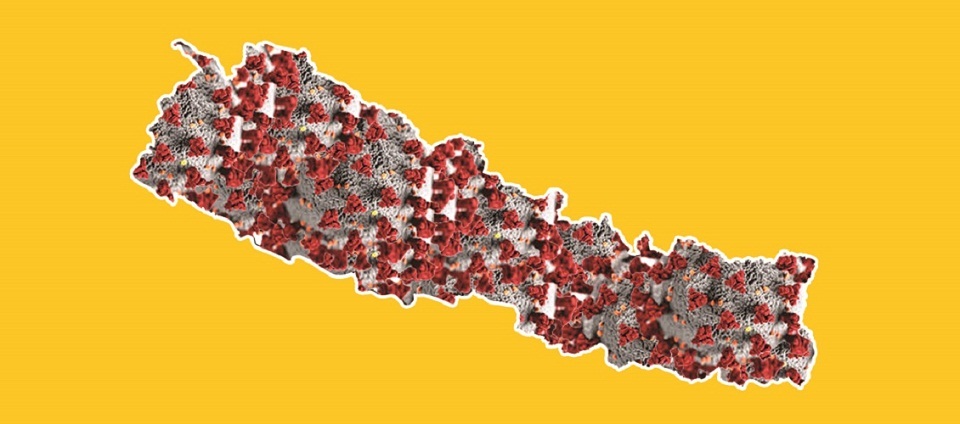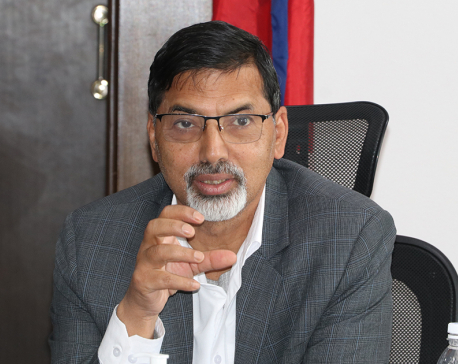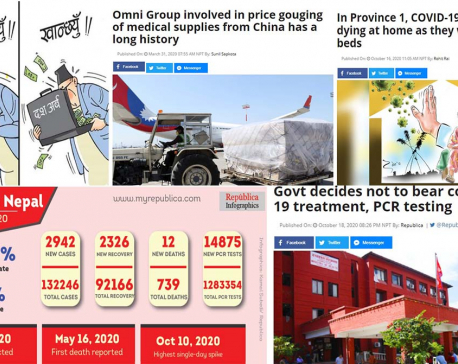
OR
How the government should communicate risk?
Published On: September 3, 2020 11:00 AM NPT By: Sujana Ghimire


Sujana Ghimire
The author, MPhil graduate in in Gender and Development at University of Bergen, Norway, is the Faculty of Sociology in Baneshwar Multiple Campusnews@myrepublica.com
More from Author
When do we realize the need to communicate and develop the strategies towards easing everyday lives while maintaining the measures of health and etiquette?
COVID-19, a viral disease which broke out in China in December 2019, was declared as a public health emergency of international concern on January 30, 2020 by the World Health Organization (WHO). More than half a year has passed with uncertainties caused by the pandemic. The whole world is suffering; only 10 countries have no cases of COVID-19 but they, too, are impacted either by depleted economy or closed borders.
Nepal enforced 120 days of first phase lockdown. Currently, we are locked down under prohibitory order. Rapid increment in the cases amidst extended restriction is an amplifier of our politico-managerial and social wrongdoings. The wrongdoings are varied and multifaceted.
The situation today is daunting and it demands all hands on the deck. For this to happen, communication among the stakeholders along with recipients is a must. Communication is not just rhetoric but undertaking perceptions of the recipients. The importance of understanding recipients’ and stakeholders’ perception multiplies while communicating the risk as it is one of the most important pathways to plan strategies further. According to the WHO, risk communication is the real-time exchange of information, advice and opinions between experts or officials and people who face the threat (from a hazard) to their health or economic or social well-being. The best practice for risk communication is to be first, fast and frequent together with helping to make informed decisions from anticipation and preparedness to early detection and containment to mitigation.
To overcome any unfavorable situation, the leadership has to be ready to deal against optimum adversity and prepare the general public with the same by communicating both the challenges and strategies. To accomplish it effectively, leadership on the one hand has to set key communicators as well as target audience and on the other accomplish KAP (knowledge, attitude and practices) surveys. It not only helps to overcome barriers in taking health advice like cultural and traditional practices, lack of trust in authorities, lack of knowledge and lack of appropriate channels but also contributes to identifying various factors that condition health seeking behavior. These processes prepare the leadership to engage communities in detecting, preventing and responding to the risk. Engaging with communities allows their direct participation in the response to address fears, barriers, concerns and to change transmission-enhancing practices, while promoting protective behavior and working together with the response teams.
Nevertheless, in our context, insulting medical personnel for demanding PPE to mocking over the virus remain the widespread message provided to the communities. MP’s spirit of turning into health specialist these days is costing dearly to humanity and is reflected in various inhumane acts being committed in the communities. Placing banners on the premises of infected doctor’s home and protesting against sheltering health workers at a hostel are some prime examples. Furthermore, turmeric remains in prolific recommendations ignoring the empirical fact that borders are closed and “walking class” are suffering.
Snatching the role of health professional as key communicator of health concerns, frequent message from political leaders on immunity power misinformed communities that those infected with COVID-19 are weak and fragile ultimately deriding them into humiliation and boycott. In the fantasy of being ubiquitous, CCMC ignored the significance of KAP survey as well as stakeholders in communities. The government is delivering through limited channels and does not evaluate the density of message at the recipient level. For instance, the government has announced to celebrate the festivals within family. Perhaps, it was due to urgency of breaking the chain of transmission within and among the toles. But, announcement was visibly disobeyed; because loud mouths of non-specialists have already diminished credibility of the leadership at community level.
Teej, which remains no longer a festival of a three-day celebration among close family, has turned into one of the symbols of status quo. The crowd for shopping and parties went through all across communities’ weeks before the prohibitory order was effective. As per WHO guidelines, incubation period of the virus is one to fourteen days in general and on average five to six days. Teej was just over a week ago and currently the headlines are community spread of virus. Did the government pay attention to look for causal relation? Had the government conducted timely KAP survey, it would have had all adequate information on how to motivate people to follow public health measures as well as whom to channelize for the motivation as key communicator in the communities.
As such, our leadership that has successfully fought against the established systems in the past seems lacking ability to fight the adversity created by the ongoing pandemic. Fighting against the system, in general, is easier compared to fight against the situation. The battle against system is unidimensional—leaders can initiate the battle by simply crossing the set limit. But, fighting against adverse situation is bidirectional; one has to fight against it and simultaneously adjust within the limit permitted.
Apparently, we, adults of the country, ourselves are the first hand eyewitnesses of the fight against monarchy, which saw the leadership cross the limit set by then constitution. In contrast, to fight against this pandemic, we are compelled to obey every tiny situational limitation enforced like hygiene and physical distancing. That is why, battle against the adverse situation demands leaders to be vocal and their voice has to appeal to the recipients to help the leaders to fight against the situation and at the same time to be within the limit set by the situation altogether.
Leader and thinker Pradip Giri in a recent interview stated that humans do not heed toward pathways of wisdom unless all the doors of stupidity are closed. Do we still have options in the way towards stupidity? If not, when do we realize the need to communicate and develop the strategies towards easing everyday lives while maintaining the measures of health and etiquette?
How long to follow the socio-economic ambiguity of celebrating different rituals and festivals? Many of them can either be halted, or be strictly limited to family members for the time being but how long should punishing the mobility of “walking class” for hand to mouth continue?
The author, MPhil graduate in in Gender and Development at University of Bergen, Norway, is the Faculty of Sociology in Baneshwar Multiple Campus
You May Like This

Efforts underway to revitalize COVID-19 hit economy: FinMin Sharma
LALITPUR, March 18: Finance Minister Janardan Sharma has said that the government has introduced various plans to get the COVID-19-hit... Read More...

As Oli government limits its role to counting deaths during the greatest public health crisis, people are dying at an alarming rate
Experts say the government has decided to shred the constitution ... Read More...

Govt urges shopping malls, restaurants and hotels to test their staff for COVID-19 at their own expenses
KATHMANDU, Aug 13: As COVID-19 cases are increasing 'massively' in densely-populated cities in Nepal, the government has urged several businesses... Read More...






Just In
- Health ministry to conduct ‘search and vaccinate’ campaign on May 13
- Indian customs releases trucks carrying Nepali tea, halted across Kakarbhitta
- Silent period for by-election to begin from midnight
- SC issues short-term interim order to govt and TU not to take immediate action against TU legal advisor Khanal
- National consultation workshop advocates to scale up nutrition smart community in Nepal
- Patan High Court issues short-term interim order to halt selection process of NTB’s CEO
- NEPSE inches up 0.15 points; daily turnover increases to Rs 2.53 billion
- Bagmati Govt mandates tri-lingual signboards in offices












Leave A Comment